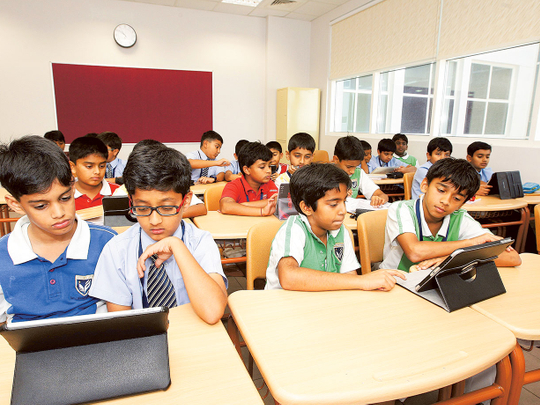
Dubai: The school curriculum for the Indian Certificate for Secondary Examination (ICSCE) from kindergarten (KG) to grade 8 is set to change with effect from the 2017-2018 academic year, officials from the Council for Indian School Certificate Examinations (CISCE) that runs the curriculum have told Gulf News.
Countering rumours that it will be phased out, Gerry Arathoon, chief executive and secretary of the CISCE, said the ICSE curriculum is being revamped. “This is the first time the council is undertaking to develop and frame the curriculum for pre-primary to class VIII ... to ensure its learners are future ready and equipped with 21st century adaptive skills which will be applicable from the next academic year,” Arathoon said.
Last year, the board modified its Grade 12 ISC examination curriculum to make it 70 per cent theory and 30 per cent practical on a par with that of the existing parallel stream — the Central Board of Secondary Education (CBSE) — and now this change in KG to grade 8 is indicative of the urgency with which the council is taking up the challenge of adaptation.
In the UAE, two major Indian curricula are followed by schools — CBSE and ICSE — and students from both streams have been doing consistently well in undergraduate studies in the West and competent job markets.
The CISCE board has been a victim of systematic rumour mongering about its curriculum being phased out due to its outdated content and teaching style, creating fears in the minds of parents. The UAE has four schools following the ICSE curriculum — The Gems Modern Academy, The Ambassador School, Jumeirah Senior Secondary (JSS) and DPS (Delhi Private School) Academy.
The CISCE issued a public notice in November 2015 to assuage the fears of anxious parents. The notice said: “CISCE, New Delhi, is a premier national examination board of India and the public examinations conducted by it have the authority and legal sanctity of Parliament in terms of Section 2(s) of the Delhi School Education Act, 1973. The certificates awarded by the council have been recognised and accepted nationally and internationally by the boards, colleges, universities and other educational institutions for higher education.
“The Ministry of Human Resources Development, Government of India, has also acknowledged the council to be a premier national examination board. There are two members nominated by the Government of India, a representative of the Association of Indian Universities (AIU) and nominees/representatives from all States of the country, where there are council-affiliated schools, apart from other members in the General Body of the council.”
Slamming the misleading reports as irresponsible, Arathoon assured all stakeholders that the ICSE and ISC examinations for Grade 10 and 12, respectively, are here to stay.
Nergish Khambatta, principal of Gems Modern Academy Dubai, one of the oldest ICSE schools since 1986, eulogised the curriculum. She told Gulf News: “Thousands of students have passed from our school with this curriculum and I can assure you that everyone has performed par excellence in SATS and other competitive examinations. Our students have got acceptance for undergraduate courses in leading universities including the Ivy League institutions in the US. the UK, Canada and Singapore and have been placed in top careers.”
In defence of the curriculum structure, she said: “Schools have a great leeway in structuring their activities around the curriculum to the benefit the students and the curriculum has a very rich potential. We go in complete depth of a subject. For instance, we have a Trinity College language enhancement programme which is compulsory for all students although examinations are not mandatory. In social studies, while we have a 100-marks paper each in History-Civics and Geography, the other curriculum has a combined paper. Once again as compared to CBSE, which has one combined paper in Biology, Chemistry and Physics, we have a paper of 100 marks each. While I think both curriculums have great merit, I am just pointing out that ICSE curriculum does attempt to go in greater depth of the subject.”
Highlighting the extra-curricular activities, Khambatta continued: “We also have a Socially Useful Productive Work (SUPW) element in our curriculum which encourages students to get involved in community service and learn one building skill. Besides this, we have the interschool debating competition and interschool essay competition which help build the overall personality of our students. With the revamp, the ICSE curriculum is going to be second to none.”
ICSE figures at a glance
1. Total number of students registered for the ICSE and ISC 2016 examinations worldwide
ICSE (Class 10): 169,390
ISC (Class 12): 72,880
2. Globally special difficulty students graduating this year with ICSE: 897 (of these, 29 were visually challenged and seven appeared for exams from the hospital bed!)
3. Number of students graduated from UAE CISCE Schools till date:
ICSE (Class 10): 2,660 students
ISC (Class 12): 2,153 students
(Source: CISCE, New Delhi)
In Gems Modern Academy, Dubai
2014: 134 students graduated from Grade 10 ICSE
2015: 172 students
2016: 215
2017 (batch): 247
(Source: Gems Modern Academy, Dubai)












